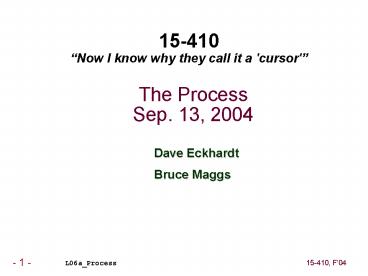The Process Sep' 13, 2004 PowerPoint PPT Presentation
Title: The Process Sep' 13, 2004
1
The ProcessSep. 13, 2004
15-410Now I know why they call it a 'cursor'
- Dave Eckhardt
- Bruce Maggs
L06a_Process
2
Synchronization
- Project 1
- Hope you've run simics by now!
- End of today
- paint character on screen
- position cursor
- Anybody reading comp.risks?
- This lecture
- Chapter 4, but not exactly!
3
Outline
- Process as pseudo-machine
- (that's all there is)
- Process life cycle
- Process kernel states
- Process kernel state
4
The Computer
5
The Process
6
Process life cycle
- Birth
- (or, well, fission)
- School
- Work
- Death
- (Nomenclature courtesy of The Godfathers)
7
Birth
- Where do new processes come from?
- (Not under a cabbage leaf, by stork, ...)
- What do we need?
- Memory contents
- Text, data, stack
- CPU register contents (N of them)
- "I/O ports"
- File descriptors, e.g., stdin/stdout/stderr
- Hidden stuff
- timer state, current directory, umask
8
Birth
- Intimidating?
- How to specify all of that stuff?
- What is your name,quest,favorite_color?
- Gee, we already have one process we like...
- Maybe we could use its settings to make a new
one... - Birth via cloning
9
Birth fork() - 1
- fork - Original Unix process creation system
call - Memory
- Copy all of it
- Maybe using VM tricks so it' s cheaper
- Registers
- Copy all of them
- All but one parent learns child's process ID,
child gets 0
10
Birth fork() - 2
- File descriptors
- Copy all of them
- Can't copy the files!
- Copy references to open-file state
- Hidden stuff
- Do whatever is "obvious"
- Result
- Original, parent, process
- Fully-specified child process, with 0 fork()
parameters
11
Now what?
- Two copies of the same process is boring
- Transplant surgery!
- Implant new memory!
- New program text
- Implant new registers!
- Old ones don't point well into the new memory
- Keep (most) file descriptors
- Good for cooperation/delegation
- Hidden state?
- Do what's obvious
12
Original Process
13
Toss Heap, Data
14
Load New Code, Data From File
15
Reset Stack, Heap
16
Fix Stuff
17
Initialize Registers
18
Begin Execution
19
What's The Implant Procedure Called?
- int execve(
- char path,
- char argv ,
- char envp )
20
Birth - other ways
- There is another way
- Well, two
- spawn()
- Carefully specify all features of new process
- Complicated
- Win don't need to copy stuff you will
immediately toss - Plan 9 rfork() / Linux clone()
- Build new process from old one
- Specify which things get shared vs. copied
- Copy memory, share files, copy environment,
share ...
21
School
- Old process called
- execve(
- char path,
- char argv ,
- char envp )
- Result is
- char environ
- main(int argc,
- char argv )
- ...
22
School
- How does the magic work?
- 15-410 motto No magic
- Kernel process setup we saw...
- Toss old data memory
- Toss old stack memory
- Load executable file
- Also...
23
The Stack!
- Kernel builds stack for new process
- Transfers argv and envp to top of new process
stack - Hand-crafts stack frame for __main()
- Sets registers
- Stack pointer (to top frame)
- Program counter (to start of __main())
24
Work
- Process states
- Running
- User mode
- Kernel mode
- Runnable
- User mode
- Kernel mode
- Sleeping
- Blocked awaiting some event
- Not run by scheduler
- Q Is this user mode or kernel mode?
25
Work
- Other process states
- Forking
- Probably obsolete, once used for special
treatment - Zombie
- Process has called exit(), parent hasn't noticed
yet - Exercise for the reader
- Draw the state transition diagram
26
Death
- Voluntary
- void exit(int reason)
- Hardware exception
- SIGSEGV - no memory there for you!
- Software exception
- SIGXCPU used "too much" CPU time
27
Death
- kill(pid, sig)
- keyboard C ?
- kill(getpid(), SIGINT)
- Start logging
- kill(daemon_pid, SIGUSR1)
- kill -USR1 33
- Lost in Space
- kill(Will_Robinson, SIGDANGER)
- I apologize to IBM for lampooning their serious
signal - No, I apologize for that apology...
28
Process cleanup
- Resource release
- Open files close()
- TCP 2 minutes (or more)
- Solaris disk offline - forever (None shall
pass!) - Memory release
- Accounting
- Record resource usage in a magic file
- Gone?
29
All You Zombies...
- Zombie process
- Process state reduced to exit code
- Waits around until parent calls wait()
- Copies exit code to parent memory
- Deletes PCB
30
Kernel process state
- The dreaded "PCB"
- (polychlorinated biphenol?)
- Process Control Block
- Everything without a user-visible memory
address - Kernel management information
- Scheduler state
- The stuff
31
Sample PCB contents
- Pointer to CPU register save area
- Process number, parent process number
- Countdown timer value
- Memory segment info
- User memory segment list
- Kernel stack reference
- Scheduler info
- linked list slot, priority, sleep channel
32
15-410 Virtual Memory Layout
33
15-410 Physical Memory Layout
34
Ready to Implement All This?
- Not so complicated...
- getpid()
- fork()
- exec()
- wait()
- exit()
- What could possibly go wrong?
35
Summary
- Parts of a Process
- Physical Memory pages, registers, I/O devices
- Virtual Memory regions, registers, I/O ports
- Birth, School, Work, Death
- Big Picture of system memory both of them
- (Numbers arrangement are 15-410specific)

